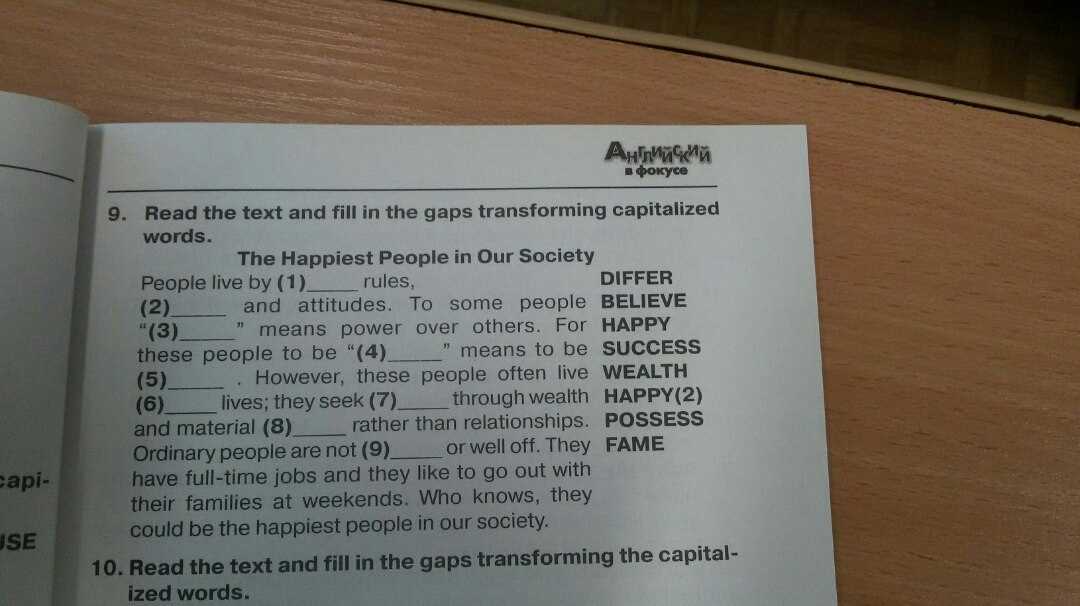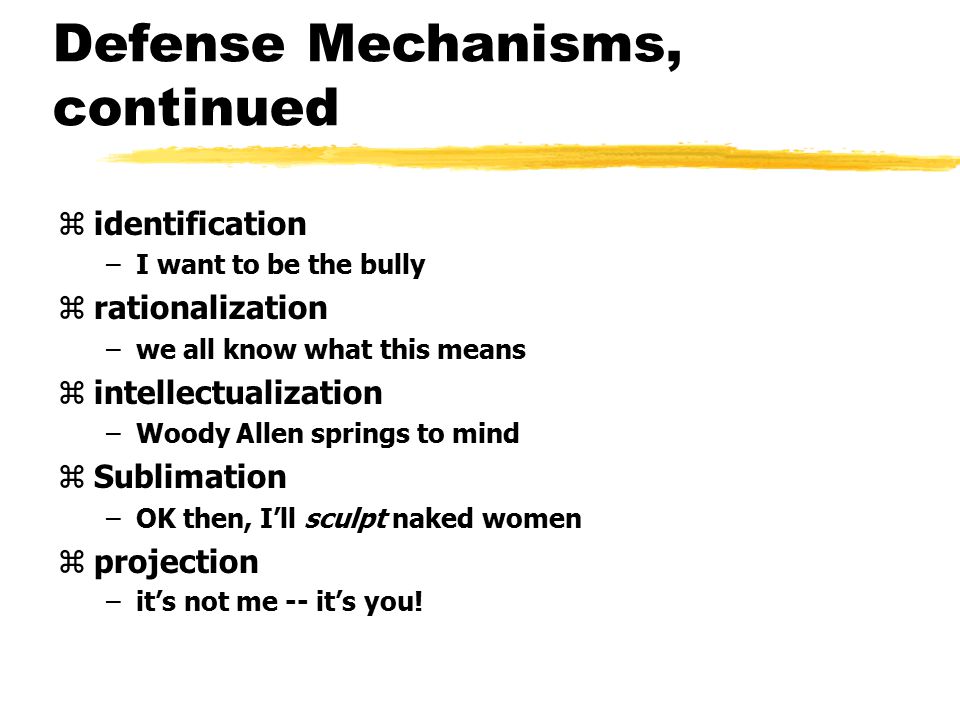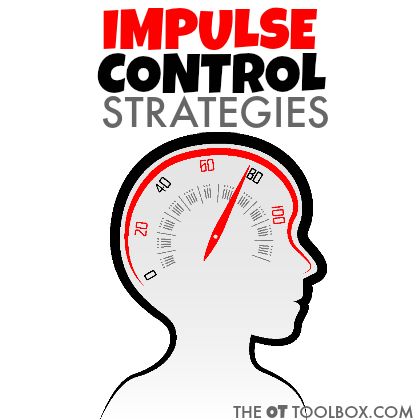Working hard at work
Hard Work Won't Make You Successful -- But Doing This Will
I don't blame anyone who has become frustrated and disillusioned with the working world. It is a huge disappointment to grow up and realize that most of what we've been taught about how to be successful is bad advice.
We were taught "Just work hard at whatever job you get, and things will work out." That's false. Working hard at your job does not get you much. When you work hard at a job where the boss doesn't value your efforts, all your hard work gets you is taken for granted. Just working hard by itself will exhaust you and shorten your lifespan without any benefits to you.
Gallery: 15 Surprising Things Productive People Do Differently
15 images
View gallery
There has to be more to success than merely working hard, or millions of people around the world would be a lot more successful than they are!
If you are at work right now, think about the investment of time and energy you are making. Imagine that you only went home to sleep for four hours a night, and gave up all the rest of your personal time to get more work done. Imagine that you practically lived at your desk and worked your tail off for the next five years. What would that extraordinary effort get you?
If you're working for a fixed salary or hourly wage the way most people are, you won't see economic benefits from pouring your energy into your job. Your boss may be grateful to you for all your extra effort, but he or she is not going to give you a pay raise every month just because you're putting in extra hours.
You're not going to get paid more just because you have great ideas. None of those investments on your part translate into tangible career success. You could donate every waking hour to your job and still get a one percent pay bump at the end of the year, or get laid off when the company realizes that you've solved all of their biggest problems and they don't need you anymore.
We can see that there's more to career success than just hard work -- so what's the magic ingredient?
The magic ingredient to success is not the good fortune to come from a wealthy family, and it isn't a great education, either, as plenty of underemployed but highly-educated people can attest. The magic ingredient for career success and satisfaction is self-determination. When you are the captain of the ship, you get to decide which way to sail. That's the only way to be successful in your career.
The magic ingredient for career success and satisfaction is self-determination. When you are the captain of the ship, you get to decide which way to sail. That's the only way to be successful in your career.
Career self-determination doesn't require you to start your own business. My friend Mike has been insanely successful in his career working for well-known employers. What makes Mike successful is that he decides what he wants to do next rather than letting the job ads or inertia decide for him.
When one job has given Mike all it's got to give, he moves on. He doesn't really care what his boss thinks about his performance. He cares what impact he's making at work -- impact that he can talk about later, with other employers, when it's time to move on!
That is really all that matters, because his boss's only influence on Mike is the influence the boss holds while Mike is actually working for that boss, and Mike never plans on staying at any organization for more than five years.
Mike is self-employed in his own mind, although he works for other people. He loves his career, has plenty of time off, gets paid very well and best of all, is healthy and happy.
Mike is not a suck-up or someone who needs to get external approval to feel good about himself. He simply knows what kinds of Business Pain he solves for employers, and that knowledge makes him very valuable as well as content in his own skin.
Mike did not come from a well-to-do family or attend a top-tier college. He follows these ten rules for career success, and you can do the same thing.
Ten Rules for Achieving Career Self-Determination
1. You'll start by creating a vision for your life and career. Your vision can change over time and it undoubtedly will, but at every point you'll be following a path that you laid out for yourself rather than somebody else's plan for you, or no plan at all.
2. When you need money and you can't find a career-type job, take a survival job. Don't make the mistake of deciding, "Now that I have this low-level job, I'm a low-level employee. I'll have to beg and grovel to get a better job." Use the survival job to earn enough money to live on while you're seeking a better job. Never, ever turn off the "available" light on your taxi cab!
Don't make the mistake of deciding, "Now that I have this low-level job, I'm a low-level employee. I'll have to beg and grovel to get a better job." Use the survival job to earn enough money to live on while you're seeking a better job. Never, ever turn off the "available" light on your taxi cab!
3. Decide for yourself what you want to do next at each point in your career. Don't be seduced by a manager who tells you, "You could have a great career in this company!" Talk is cheap. Stay in control of your forward motion and if it slows down to an unacceptable degree, move on!
4. Know yourself. Most folks rely on other people to tell them what they should be doing professionally. If you want to achieve career self-determination, you have to be honest with yourself and you have to look in the mirror. You don't have to feel bad about anything in your past, because it is impossible to make a mistake as long as you get the learning from every experience.
5. When you take a new job, make sure it's because you like and trust the people, not because they offer you a fancy title or a big salary. A lot of jobs that look good from the outside are rotten on the inside and will make you sick. Listen to your gut above every other guide!
A lot of jobs that look good from the outside are rotten on the inside and will make you sick. Listen to your gut above every other guide!
6. Keep in mind that you are a consultant and the CEO of your own career, whether you work for a big corporation, a tiny startup or yourself. How you get paid is a detail. Mike remained the CEO of his own career through six or eight job changes and he's not ready to give up that title yet!
7. Get a consulting business card and begin to think of yourself as a consultant who solves problems for clients, even if you're not ready to take on clients yet. Give out your consulting business card instead of any business card your employer gives you. Make a plan for your fledgling consulting business. What kinds of services will you offer? What problems will you solve for your clients? How much will you charge them for your services?
8. Get a journal and write in it every day or as often as you have time. Write about your career and your plans for your life. Write about your goals and setbacks. Write about your feelings and your dreams and ideas. You are cooking up something magnificent. Get it out of your head and onto the page!
Write about your goals and setbacks. Write about your feelings and your dreams and ideas. You are cooking up something magnificent. Get it out of your head and onto the page!
9. Choose carefully who to spend time with. Your time is your most precious resource. Spend as much time as possible with people who grow your flame and avoid people who suck your life force away.
10. Finally, find your voice and advocate for yourself. Every successful person has had to face a lot of naysayers and haters and they've had to walk away from situations that were not a good fit. You will not be successful by trying to please everyone or by letting yourself become a doormat. Speak up and say what you feel. Not everyone will like it. You might even get fired once or twice. It's not a big deal and getting fired will actually make you stronger and more convicted. To be successful, you have to give up the idea that you can play it safe and still achieve your dreams.
Life is temporary. Every job is temporary, too.
You get to decide how to spend every year, every month and every minute of your precious time. You get to decide when to let other people steer your ship and when to grab the wheel.
This moment is the perfect time to take back control of your career and start running your working life as a business -- what are you waiting for?
Why hard work alone isn't enough to get ahead
Loading
How we work
(Image credit: Getty Images)
By Kate Morgan27th September 2021
We're constantly taught the recipe for getting ahead is to put our heads down and outwork everyone else. But that's not quite right.
T
This article contains strong language some readers may find offensive
Late this summer, UK author Kate Lister had a realisation that resonated. On Twitter, she wrote: “How old were you when you realised your original plan of being really nice, working really hard, & taking on much more than you should in the hope you would be automatically rewarded for this without asking, was totally shit?”
Cynical or not, the sentiment resonated: more than 400,000 people have liked or retweeted it.
Despite adages and advice that tell people from a young age hard work will get you everywhere, it really won’t, says Jeff Shannon, an executive coach, and author of Hard Work is Not Enough: The Surprising Truth about Being Believable at Work. He believes “hard work is a good start”, and early in your career, it can certainly help you establish yourself in a job.
But it’s not enough to take you all the way to the top. “At a certain point you look around and realise, wow, everyone works hard at this level. Expertise and hard work just become the expectation, and will not help you up the ladder.”
So, yes, it’s unfair the system doesn’t simply value hard work flat out – but it’s an important reality for workers to grapple with, especially if they’re struggling to climb the ladder. To really get ahead, you need to be doing more than just your job. Realisations like Lister’s often come on the heels of watching colleagues with similar (or fewer) abilities soar, while your career stagnates. More often than not, those who rise are the ones willing to politick their way to the top, while you were too busy just working hard to notice you should be working the room.
More often than not, those who rise are the ones willing to politick their way to the top, while you were too busy just working hard to notice you should be working the room.
Hard work, says Shannon, doesn’t much matter if no one recognises you’re doing it. To translate that effort into promotions and advancement, especially in a changed world of work, you have to make people notice it – and you.
Getting to your desk before anyone else isn't enough – you have to trumpet your accomplishments (Credit: Getty Images)
The ‘tiara effect’ trap
Hard work is still very important, says Carol Frohlinger, president of US-based consulting firm Negotiating Women, Inc. But simply waiting for someone to pick up on it is detrimental.
Frohlinger calls this tendency the “tiara effect” (a term Sheryl Sandberg also cited in Lean In). “People work really hard and deliver fabulous results and hope that the right people notice and come along and place a tiara on their heads. But that usually doesn’t happen,” she says. “One of the things that can happen to people who do good work and nothing else is that they’re under the radar. So, when there’s an opportunity for promotion, nobody thinks of them. They’re just forgotten, in a benign sort of way.”
But that usually doesn’t happen,” she says. “One of the things that can happen to people who do good work and nothing else is that they’re under the radar. So, when there’s an opportunity for promotion, nobody thinks of them. They’re just forgotten, in a benign sort of way.”
This flies in the face of societal training that begins as early as primary school, when students are taught that the quiet, hard workers are those most likely to prosper. Because teachers reward such qualities in early years, we tend to expect our eventual bosses will, too. It’s frustrating, then, to enter the working world only to discover this engrained lesson is often incorrect.
In fact, as Shannon notes, hard work alone typically goes unnoticed after a certain point, because everyone around you is working at or about the same level. If you don’t draw attention to yourself in other ways, it’s easy to fade into the background.
While both men and women are susceptible to supervisors overlooking their hard work, Frohlinger says women are often more negatively impacted, because it’s generally seen as more acceptable for men to talk about their accomplishments. “For women, it can be seen as bragging, and bragging women can be punished,” she says.
“For women, it can be seen as bragging, and bragging women can be punished,” she says.
So, how do you get around the stereotype? The answer – for men as well as women – is to find a way to draw attention to your endeavours without waiting for something as infrequent as a yearly review or performance self-assessment.
“What happens in a lot of companies and organisations is that you wait until the very end of the year, when you do the ‘I love me’ [self-assessment] memo,” says Frohlinger. “But you just can’t wait a year.”
She suggests giving the boss more frequent, albeit succinct, updates, and being sure to put accomplishments in context. “It could be just a quick email with some bullet points: here are my wins, and here’s what they did for us,” she says. “Here’s why it was helpful for our team, or how it saved the company money.” Frequency and word choice matter, adds Frohlinger. “Nobody wants to hear it every day. Using phrases like ‘my team and I’ helps you make yourself look good while also sharing the kudos. ”
”
Framing is important, too. A boss may find it odd to get an unsolicited update singing your own praises, but it’ll go over better cast as a check-in or a way to “keep them in the loop”, says Frohlinger.
The value of politics
Yet in most offices and industries, proven ability alone isn’t enough to help you get ahead, because you also need to be likeable and memorable. “If you want to have impact and influence, people need to trust and believe in you,” says Shannon, the same way they do a candidate they support.
Putting your head down to work and grinding it out doesn't mean your supervisors will notice and laud you (Credit: Getty Images)
Basically, to climb the ladder, it’s necessary to be not just a great worker, but a bit of a politician.
“You need to be seen as a leader,” says Frohlinger. “You need to be liked: by people at your level, by people above you and by people below you. When you evaluate work, the research is quite clear – people who are liked get better ratings, even if their work is the same. ” And therein lies the unfair truth: you and a colleague may have the exact same skills and work ethic, but if they’ve spent more time making friends and influencing people, they’ll look better at their job. Bosses are human, too, and it’s simply a basic instinct for them to favour people they like.
” And therein lies the unfair truth: you and a colleague may have the exact same skills and work ethic, but if they’ve spent more time making friends and influencing people, they’ll look better at their job. Bosses are human, too, and it’s simply a basic instinct for them to favour people they like.
However, it is very possible to increase your political capital at work. There are basic tactics that can make you a well-liked member of the office, simply by paying attention to your colleagues. “You need to think about how to connect with people other than just on the work,” says Frohlinger. “Do we have a shared hobby or interest? Let’s say I know you like gardening, and I see this gardening article and I send it to you. That’s pretty simple, but you’re going to like me more.”
While it may seem a bit manipulative, that kind of glad-handing doesn’t actually hurt anyone, and it’s what may be necessary to get ahead. It may require a reorganisation of priorities for those who’d rather focus on their to-do list over socialising. But going against that instinct can be beneficial. It’s all part of career maintenance, which Frohlinger says is every worker’s responsibility.
But going against that instinct can be beneficial. It’s all part of career maintenance, which Frohlinger says is every worker’s responsibility.
“If you don’t take care of your career,” she says, “nobody else is going to do it.”
How to Work Hard / Sudo Null IT News
"Obsession"
It may seem like nothing can be done to learn how to work harder, but it's not. At first glance, there is no need to learn how to work hard. Everyone who has been to school knows what hard work is, even if they didn't work hard. At the same time, when people ask me if I know more about hard work now than at school, the answer is always yes.
I know one thing: if you want to do great things, you have to work very hard. As a child, I wasn't sure. School assignments varied in difficulty; You don't always have to work very hard to be successful. And some of the things famous adults did seemed to be done almost effortlessly. Maybe there is some way to avoid hard work with pure talent? Now I know the answer to this question.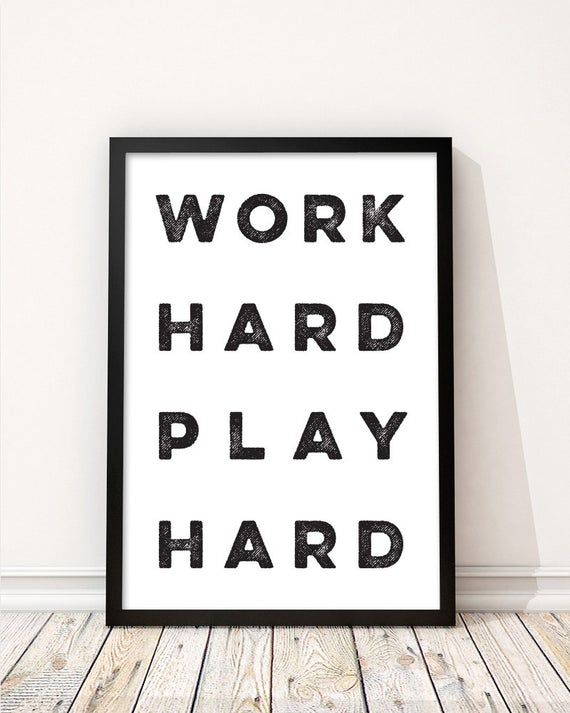 No. nine0005
No. nine0005
The reason some subjects seemed easy to me was because my school had low standards. And the reason famous adults seemed to make things easy is years of practice. Thanks to years of practice, it seems that the master does the job easily.
Of course, these prominent adults usually had a lot of natural ability. To do the Great Work, there are three ingredients: natural ability, practice, and effort. You can do just fine with just two, but to perform at your best you need all three: you need great natural ability, a lot of training, and a lot of effort. [nineteen0005
Take, for example, Bill Gates - one of the smartest entrepreneurs of his time, at the same time he is distinguished by incredible diligence. He said: “When I was 20, I didn’t have days off. No one." Or another example is Leonel Messi: an athlete who is incredibly talented from birth, but all the coaches who work with him in his youth remember, first of all, not his talent, but his perseverance and will to win.
If I were asked to choose the best English writer of the 20th century, I would no doubt give my vote to PJ Wodehouse - perhaps there is no one whose style looks so easy, and there is no one who would work so hard on his works. At 74, he wrote:
“With each new book I wrote, I had the feeling that this time I got a bitter lemon from the tree of literature. But I suppose it's even good. Something keeps you on your toes and makes you rewrite one sentence ten times. Or even twenty times.
Sounds like an extreme, you might think. Yet Bill Gates goes over the edge even more. Not a single day off in ten years? These two had as many abilities as anyone could have, and yet they worked as hard as they could. You need both. nine0005
It seems so obvious, but in practice we have a hard time understanding it. There is a weak contrast between talent and hard work. Partly it comes from popular culture, where it's all deeply rooted, and partly from the fact that there aren't many people in the world who stand out from the crowd. If great talent and great aspiration are rare, then people with both are doubly so. Most people you meet who have more of one will have less of the other. But you need both if you want to stand out. Because you can't change your natural ability, the challenge of making a job stand out comes down to hard work. nine0005
If great talent and great aspiration are rare, then people with both are doubly so. Most people you meet who have more of one will have less of the other. But you need both if you want to stand out. Because you can't change your natural ability, the challenge of making a job stand out comes down to hard work. nine0005
It's easy to work hard if you have clearly defined and externally imposed goals, like in school. There is a technique for this: you need to learn not to lie to yourself, not to procrastinate (which is a form of lying to yourself), not to get distracted and not to give up when something goes wrong. But this level of discipline seems to be within the power of even very young children, if they want it.
What I have learned to do since I was a child is how to achieve goals that were neither clearly defined nor imposed. You will probably need to learn how to accomplish these kinds of goals if you are to achieve great things. nine0005
The most basic level is just feeling like you have to work without anyone else's instructions. Now that I'm not working hard, the alarm bells are ringing. I can't be sure that I'm good at something when I'm working hard, but I can be sure that I'm not good at anything when I'm not working, which is a terrible feeling.
Now that I'm not working hard, the alarm bells are ringing. I can't be sure that I'm good at something when I'm working hard, but I can be sure that I'm not good at anything when I'm not working, which is a terrible feeling.
There was not a single moment when I learned this. Like most young children, I enjoyed the feeling of accomplishment when I learned or did something new. As I grew older, this feeling transformed into a feeling of disgust when I did not achieve anything. The only accurately dated milestone I have is when I stopped watching TV, at the age of 13. nine0005
Those with whom I spoke recall that it was at this age that they began to take work seriously. When I asked Patrick Collison when he began to consider idleness unacceptable, he replied:
I think around 13 or 14 years old. And I clearly remember how, somewhere at that age, I sat in a room, looked out the window and could not understand why I wasted my summer holidays on nonsense.
Probably, in youth, something changes. It makes sense.
It makes sense.
Oddly enough, perhaps the biggest difficulty in getting serious about work was school, which made work (what they call work) seem boring and pointless. I was forced to find out what real work was before I could, with all my heart, want to do it. It takes time, because even in college there is a lot of pointless work; there are even entire departments that are meaningless. But once I got to know the essence of the real work, I found that my desire was contained within it as if they were made for each other. nine0005
I suspect that most people need to know what a job is before they can love it. Hardy wrote eloquently about this in the Apology of a Mathematician:
“I do not remember having a passion for mathematics as a child, and my ideas of a career as a mathematician were far from noble. I thought about math in terms of exams and scholarships: I wanted to screw the other boys over, and that seemed to be the way I could do it most emphatically."
He never understood what mathematics was until, while studying at university, he read Camille Jordan's Cours d'analyse.
“I will never forget the shock with which I read this outstanding work, which inspired so many future mathematicians of my generation; studying it, I first realized the true essence of mathematics.
There are two different kinds of fake that you have to learn to discount in order to understand what real work is. Hardy met one of them at school. Subjects are adapted to teach children, often distorting the essence so much that it no longer has anything to do with the work of real practitioners. [3]
Another kind of falseness is inherent in certain types of work. Some types of work are counterfeit in nature, and, at best, simply give the appearance of activity.
There is a "thoroughness" in this work. Not all of it compares to writing Newton's Principia Mathematica, but any serious work gives a sense of the need for what you are doing.
Once you understand the essence of real work, you must understand how many hours a day you need to spend on it. You can't solve this problem by simply working every spare hour, because in many jobs there is a point where the quality of the output starts to decline. nine0005
nine0005
This limit depends on the specific job and person. I did several different types of work, and for each of them the limit was different. My limit for heavier jobs like writing or programming is about five hours a day. Whereas when I was running a startup, I could work all the time. At least for the three years that I did it; if I had continued to work longer, I would probably have had to take occasional vacations. [5]
The only way to find the limit is to cross it. Cultivate sensitivity to the quality of the work being done, and then you will notice if it decreases due to the fact that you work too much. Honesty is essential here, and in both directions: you need to notice when you are lazy, as well as when you work too hard. And if you think there's something admirable about working too hard, put that thought out of your mind. You will not only get worse results, but you will get them because you show off - if not in front of other people, then in front of yourself.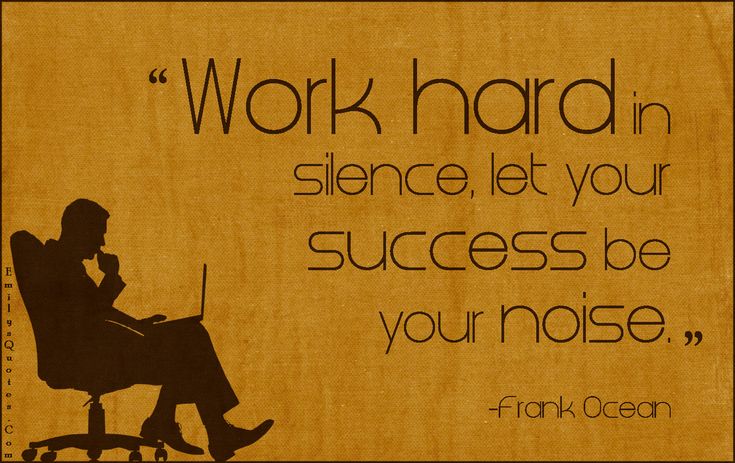 [6]
[6]
Finding the limit of hard work is an ongoing, continuous process, not a one-time task. Both the difficulty of the job and your ability to complete it can vary from hour to hour, so you need to constantly evaluate how hard you are trying and how well you are doing.
Trying doesn't mean constantly pushing yourself to work. There may be people who do this, but I have to push myself from time to time (I think my experience is typical) when I start a project or face some kind of review. That's when I'm in danger of procrastinating. But once I start, it's hard to stop. nine0005
The reasons that keep me going depend on the type of work. When I worked on Viaweb, I was driven by the fear of failure. I didn't really mess around back then, because there was always something urgent that needed to be done, and if there was anything I could do to keep the monster called failure away from me, why not do it immediately?
Now, when I write my essays, I am pushed by their imperfection. Between writing, I spin around on my axis like a dog deciding where to lie down. But once I start working, I don't have to force myself, because some mistake or flaw in the text makes me work. nine0005
Between writing, I spin around on my axis like a dog deciding where to lie down. But once I start working, I don't have to force myself, because some mistake or flaw in the text makes me work. nine0005
I make some effort to focus on important topics. A large number of problems consist of a "complex" core that is surrounded by lighter peripheral subtasks. Working hard means striving to solve the central tasks as much as possible. Sometimes you won't be able to and will have to work on easier tasks. But you should always strive to work as close to the core as possible without stopping.
The more important question of "what to do with your life" is one of the problems with the "complex" core. There are important issues in the center, which are usually difficult, and less important, lighter ones at the edges. So, in addition to making small daily adjustments related to working on a particular problem, you will sometimes have to make big lifelong adjustments to what type of work to do. And the rule is the same: to work hard means to strive for the center - for the most ambitious problems. nine0005
And the rule is the same: to work hard means to strive for the center - for the most ambitious problems. nine0005
By center, however, I mean the real center, not just the current consensus about the center. The consensus about which issues are most important is often wrong, both in general and in specific areas. If you don't agree with this, and you're right, this could be a valuable opportunity to do something new.
The more ambitious types of work are usually harder, but while you shouldn't deny it, you shouldn't take difficulty as a definitive indicator of what's worth doing either. If you find that some ambitious type of work gives you an advantage, being easier for you than for everyone else, or because of the opportunities that you are lucky to have, or because of some new approach that you discovered , or simply because you feel more excited about this work, in any case - take it. Often the best work is done by people who have found an easy way to do something complex. nine0005
nine0005
Once you understand what a real job is, you need to realize which one is right for you. It's not about just matching your natural ability to different types of challenges (just because you're under 2m doesn't mean you should go to basketball). How suitable a job/task is for you depends more not on your talents, but on your interests. A strong interest in a topic makes people work harder than any discipline.
It can be more difficult to discover interests in oneself than talents. nine0005
There are fewer kinds of talents than interests, and they begin to be appreciated in early childhood, while interest in a topic is a subtle thing that may not mature until the age of twenty or even later. And before this topic may not exist at all. In addition, there are several powerful sources of errors that you need to learn to discount. Are you really interested in question X, or do you want to work on it because you will make a lot of money, or because other people will be impressed with you, or because your parents want it? [8]
The difficulty of deciding what to work on varies greatly from one person to another. It's one of the most important things I've learned about work since I was a kid. As a child, you get the impression that everyone has a calling and all they have to do is find out what it is. That's how it works in films and streamlined biographies fed to children. Sometimes it works that way in real life. Some people figure out what to do as kids and just do it like Mozart. But others, like Newton, shift restlessly from one job to another. Perhaps, in hindsight, we can identify one of them as their calling - we may wish Newton spent more time on mathematics and physics and less time on alchemy and theology - but this is an illusion caused by bias. There was no voice calling him that he could hear. nine0005
It's one of the most important things I've learned about work since I was a kid. As a child, you get the impression that everyone has a calling and all they have to do is find out what it is. That's how it works in films and streamlined biographies fed to children. Sometimes it works that way in real life. Some people figure out what to do as kids and just do it like Mozart. But others, like Newton, shift restlessly from one job to another. Perhaps, in hindsight, we can identify one of them as their calling - we may wish Newton spent more time on mathematics and physics and less time on alchemy and theology - but this is an illusion caused by bias. There was no voice calling him that he could hear. nine0005
So if for some people life converges quickly, then there will be others whose life never converges. And for these people, figuring out what to work on is not so much a prelude to hard work, but a permanent part of it, like one of many simultaneous equations. For these people, the process I described earlier has a third component: along with measuring how hard you are working and how well you are doing, you should consider whether you should continue in that area or switch to another. If you are working hard, but not getting good enough results, you should change your field of activity. It sounds simple, but in practice it is very difficult. Don't give up on the first day just because you work hard and don't achieve anything. You must give yourself time before leaving. But how long? And what do you do when a job that worked well no longer works? Then how much time will you give yourself? [nine]
If you are working hard, but not getting good enough results, you should change your field of activity. It sounds simple, but in practice it is very difficult. Don't give up on the first day just because you work hard and don't achieve anything. You must give yourself time before leaving. But how long? And what do you do when a job that worked well no longer works? Then how much time will you give yourself? [nine]
What are generally good results? This can be quite difficult to determine. If you're researching an area where only a few have worked, you may not even know what good results look like. History is full of examples of people who underestimated the importance of what they were working on.
The best indicator of whether something is worth working on is whether you find it interesting. Such an indicator may seem overly subjective, but it is probably the most accurate one you can get. It is you who are personally involved in this matter. So who better than you to judge how important this work is and what better predictor of its importance than how interesting this work is to you personally? nine0005
For this indicator to work, you need to be honest with yourself. Indeed, this is the most striking thing about hard work: how in each case it depends on honesty with oneself.
Indeed, this is the most striking thing about hard work: how in each case it depends on honesty with oneself.
Hard work is not just hard work 11 hours a day. This is a complex dynamic system that needs to be fine-tuned at every point. You must understand the essence of real work, see clearly what kind of work you are best suited for, strive as close as possible to its true essence, make accurate judgments at every moment about what you are capable of and how you do it and Spend as many hours as possible every day without compromising the quality of the result. These interweavings are too complex to cheat. But if you are consistently honest and far-sighted, it will automatically take on an optimal shape, and you will become as productive as few people are. nine0005
Useful materials
- A selection of 143 translations of Paul Graham's essays (out of 184)
- 75 lectures in Russian from Y Combinator (out of 172)
- Y Combinator: Russian speaking founders of
- Startups Y Combinator is looking for in 2020
- Y Combinator Chat
- Facebook public YCombinator in Russian
How to motivate yourself to work hard
Skip to contentMotivation to work hard if lazy: 5 insights
“How to motivate yourself to work hard? I do the necessary minimum calmly, but there is no way to work above the norm, for the future.
I know that without this I will remain where I am, but I would not want that”
Irina
The ideal story is, of course, when the work is not hard, but effective. But since without hard work at the beginning it is impossible to achieve efficiency in the long term, then you really have to learn diligence and the ability to motivate yourself. nine0005
Motivation for work, as for everything in life, depends on the hormonal cocktail in the body: if the proportions of ingredients change, the result changes. But it works both ways: with our thoughts and actions, we can influence the hormonal background, and, as a result, create the results we need.
So, there is a recipe for motivation, and here are the ingredients.
5 insights that lead to work motivation
1. You are the first and main recipient of the results, and only you decide what they will be
There is one amazing study on retirement savings. Scientists observed the participants - clinical procrastinators - and found that when they thought about themselves in the distant future, they activated the same parts of the brain as when thinking about, attention, third parties! That is, thinking about their old age, they had the feeling that they were thinking about completely different people.
Scientists observed the participants - clinical procrastinators - and found that when they thought about themselves in the distant future, they activated the same parts of the brain as when thinking about, attention, third parties! That is, thinking about their old age, they had the feeling that they were thinking about completely different people.
It is not surprising that they did not save money - how to motivate themselves, if for them it was tantamount to depriving themselves of funds now in favor of some unknown (and so far non-existent) person. nine0005
What the scientists did: they took the participants' avatars and aged them, and then gave some participants the opportunity to communicate with the aged version of themselves in virtual reality. The results were not surprising: those who talked with their future selves began to save money without a grain of salt. This incomparable feeling, when rose-colored glasses are removed from you, provoked a cocktail of fear and sadness. And this cocktail is one of the most bitter. The motivation to work and act, provoked by cortisol, will not keep you waiting. nine0005
And this cocktail is one of the most bitter. The motivation to work and act, provoked by cortisol, will not keep you waiting. nine0005
If you don't understand how to motivate yourself, then understand this:
You are the recipient of all results.
The same you, so vague and distant now, but more than real during the meeting with the results of your (without) activity. Think now, are you ready to live in poverty and discomfort, getting crumbs? Do you want to ride in cramped minibuses, get used to the stink in the subway?
People get used to everything. Is it always necessary?
Your success affects those you care about.
Your results affect not only you - the waves of your activity wash over those around you: your children, parents, lovers, brothers and sisters, friends. You influence each other's lives, and what that impact will be is up to you.
Ask yourself these questions:
Am I improving the lives of those I love, or vice versa?
Am I making their life easier and more interesting, or vice versa? nine0115
Will I be able to help them in difficult times?
It is a mistake to think that hard work will "take" you away from your loved ones - let's be honest, off-scale workaholism threatens a tiny percentage of people. If you prioritize correctly, you will always have time for the most important thing. Believe that being busy, but successful and able to improve the lives of your loved ones is much better than always being “at hand”, but to no avail.
If you prioritize correctly, you will always have time for the most important thing. Believe that being busy, but successful and able to improve the lives of your loved ones is much better than always being “at hand”, but to no avail.
2. Be aware of the little things that you can trip over, fall and ... not get up
It is impossible to force yourself to work as long as there are little things that imperceptibly kill the remnants of motivation.
This is:
2.1. Lack of a clear plan and sequence of actions
It's like having a dartboard hanging in front of you without darts and knowledge of the rules. If the goal is blurry, like a blur, and no deadlines are poking you in the back, you will not do anything.
Because you don't know what to do.
In this case, everything is simple: give yourself time and concentration to slowly write down a list of specific actions and their sequence. nine0005
P. S.: If you're putting off writing this list because you don't believe you can follow it, then the problem is complex. Read more)
S.: If you're putting off writing this list because you don't believe you can follow it, then the problem is complex. Read more)
2.2. Lack of understanding “Why?”
As I already wrote here , the profit from achieving the goal (in this case, the goal is to work hard and efficiently) should be obvious and not letting you forget about yourself, like a blinding sun at noon. The brain is not a fool to waste itself on everything, and if it does not see clear benefits, then dopamine will not give out for achievement. No dopamine - no motivation to work. nine0005
All people have their own hooks, by hooking which we stimulate the production of hormones of motivation.
These can be:
- Ambition and recognition
- Envy and rivalry
- Money and luxury
- Creativity
- Influence, desire “to make a difference” (to influence something)
Mastery of self-motivation is the ability to invent external stimuli consciously even when there are none. To do this, you need to know exactly what exactly “turns on” you, and play on it. This is one of the working ways to force yourself to succeed by skillfully poking yourself with needles. nine0005
To do this, you need to know exactly what exactly “turns on” you, and play on it. This is one of the working ways to force yourself to succeed by skillfully poking yourself with needles. nine0005
Remember, there are no shameful reasons to motivate yourself to do something, especially if it is motivation to work.
2.3. Dislike for one's work
One concept states that, under certain conditions, almost any work can give a person pleasure. But certain conditions, of course, try to comply.
It happens that work seems meaningless and boring, no matter how you look at it. It happens that you hate your employees and your boss, and at least get motivated, and one association with them causes anger for the entire work process. nine0005
This is important to realize. And realizing, do not motivate yourself, but urgently change hard labor to a normal job.
2.4. Feeling of punished initiative (learned helplessness)
Learned helplessness happens when control over the results of work (and any activity) is in the hands of third parties who evaluate every human action as unsuccessful. This leads to a sense of the meaninglessness of any action and to the feeling that the initiative will still play against the initiator. nine0005
This leads to a sense of the meaninglessness of any action and to the feeling that the initiative will still play against the initiator. nine0005
Wrote the report before the deadline? What for? It would be better to do an audition.
Called all the clients on the list? What did you tell them? According to the scheme? So it was necessary to say more about new products, why didn't you think of it...
Where should a person who is constantly beaten on the hands find motivation?
To change this, again, it is important to identify first. What to do next with the WB, I told in detail in this video .
3. Small steps are the beginning of big accomplishments
The unaccustomed truth is that motivation almost always becomes not the cause, but the result of actions already taken. Yes, sometimes something really “turns us on” even before the start. But this is almost always something beyond our control, external, often negative, that hits hard on the head. Either this is something frightening, like the possibility of loss, or wounded pride. Sometimes (much less often) this is something that promises a big tasty bun. nine0005
Either this is something frightening, like the possibility of loss, or wounded pride. Sometimes (much less often) this is something that promises a big tasty bun. nine0005
In other cases, people's thoughts and desires are turned upside down:
"First give me a dream job, and only then I will work hard at it"
"First give me a good figure, and then I will be more willing to be correct eating and exercising”
“First give me a great relationship with a great partner, and only then I will become the one with whom it is cool”
your business, and then, as a consequence of your indispensability, a dream job happens to you. The same with the figure, and with relationships, and with everything in this life. nine0005
It's like asking a car to drive at 100 km/h before you turn on the ignition and step on the gas.
But to get moving if you don't feel like working, there is one guaranteed way that works like a Swiss watch.
Just get started. And definitely from the simplest.
And definitely from the simplest.
It's a huge mistake to put the most difficult and painstaking task first on the list when you google how to properly motivate yourself. Save this “hardest first” trick for the advanced level (which you will definitely get to). nine0005
The simpler the first step, the easier and more pleasant it is to take it.
There is a special technique for this Flow List
We give it to NLP Practice for all participants. It launches a stream of achievements for those who have fallen too deep into the pit of procrastination and do not know where to find motivation for work, sports, and education. Technique is freely available - use it to your health!
(If you have already tried it, share the results in the comments - what difficulties, questions, results did you have?)
4. Once in the flow, do not fall out of the cage
Motivation to work appears by itself, as a result of entering the flow. But where it is easy to get in, it is easy to fall out. Especially now, when our attention is thrown into free swimming, it is enough to let go of the reins a little.
But where it is easy to get in, it is easy to fall out. Especially now, when our attention is thrown into free swimming, it is enough to let go of the reins a little.
Our brain resists concentration because it eats up so much effort. But this is exactly the case when maintaining order is much easier than restoring it. nine0005
When you start, don't get distracted.
When you interrupt your activity every half hour by checking your Facebook notifications, you have to drag yourself to the beginning every time. And if we had not gone the distance, we would have reached much further and faster.
It works like a chain reaction: it only takes one element to fall down.
At first you slept until noon. Without making the bed, you went to have breakfast, while watching useful videos, breakfast stretched for 2 hours. After that, you did not wash the dishes, continuing to watch videos and follow links to articles. Then they realized that it was already 5 pm, and there was no point in starting to work, and you were too sleepy for the hall. You chat with friends, read a book, surf the Internet. Broken, you fall asleep at one in the morning, and it's great that the bed was spread out. And it all started with the fact that you slept until noon. nine0005
You chat with friends, read a book, surf the Internet. Broken, you fall asleep at one in the morning, and it's great that the bed was spread out. And it all started with the fact that you slept until noon. nine0005
Fortunately, this process is reversible if it is recognized in time. The chain reaction works both ways, and the flow can be entered from anywhere. The main thing, again, is to just start. Without looking back at the supposedly "already written off" hour, day, week, month.
5. On long distances Regularity is more important than Intensity
Those who tend to put in too much effort make outputs with force and quickly burn out, alternating periods of overproduction with a state of full bottom. The procedurers are concentrated on regularity of their actions. They understand that relying only on motivation is unreliable, and overproduction depends on many factors and is not always possible. But they know that at least something can always be done.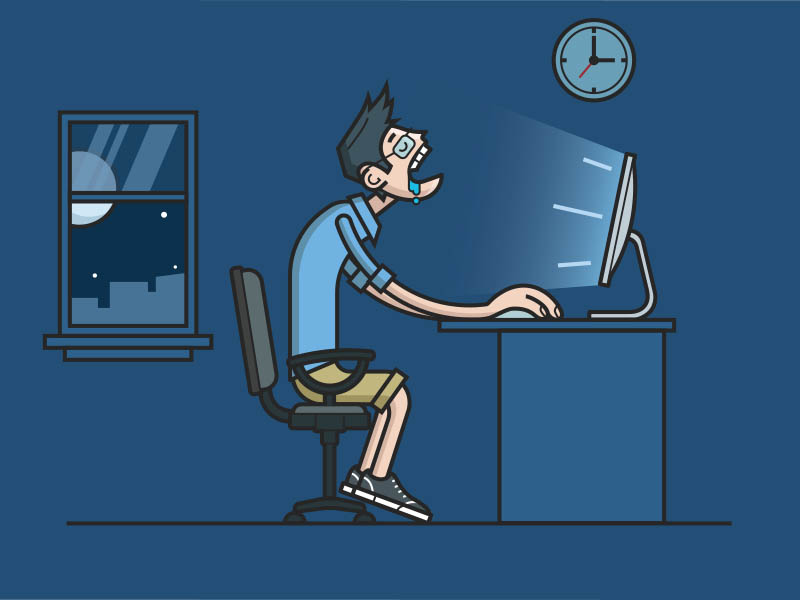 And they do.
And they do.
"Intensifiers", on the other hand, are unreasonably demanding of themselves and are in a great hurry: it seems to them that they must plow for wear and tear and rush towards the results, otherwise why all this? And when it turns out that “this is all” takes time, they take it personally, hang their hands and a couple of insulting labels on themselves in addition. Or simply tired. nine0005
Setting yourself up for work and increasing your efficiency is easier when there is discipline that has laid and fixed neural pathways in the brain. Then hard work will become just a habit and will not cause internal struggle, but will only bring satisfaction and, of course, excellent results.
Set goals not for results, but for the behavior that will lead to them.
This is written in detail here .
And remember: over a long distance, you can maintain balance only by moving smoothly and without stopping, relegating only the most key stages to “exits by force”.
